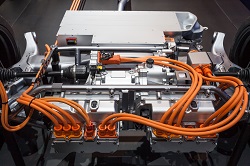Full speed ahead for an e-propulsion solution for land, sea and air transport
E-propulsion systems are the powertrain systems which provide electrical propulsion for fully electric cars, ships and aircraft. They typically consist of the electrical components, power electronic converters, control systems and batteries, necessary to enable movement in vehicles. If electric vehicles, offering less environmental pollution than fossil fuel powered varieties, are ever to become widely viable, these electric powertrain systems will have to be more efficient than is currently the case. To contribute to the expertise necessary to achieve these efforts, the ADEPT (ADvanced Electric Powertrain Technology) project set out both to establish and train a multi-disciplinary research network, funded under the EU’s Marie-Curie Action: Initial Training Networks grant and to produce a virtual development environment for e-propulsion systems. The people and the platform The ADEPT project created a training network consisting of 12 Early Stage Researchers (ESRs) and two Experienced Researchers (ERs). Personalised training was developed for the network members through a collaboration which offered applied research methodologies, knowledge transfer, support for publications, secondments and workshops. The training program covered an extensive range of fields including vehicle integration of e-propulsion; electromagnetics; thermal, mechanical and vibro-acoustic systems, as well as vehicle control applications. Reflecting on the success of the project, coordinator Professor Elena Lomonova puts some of it down to the, “Professionalism of the international team, their extended network and their ability to tackle very complex and challenging tasks together.” In addition to supporting the talent necessary to take e-propulsion to the next level, the project also developed a virtual platform, for predictive analysis and simulation of proposed systems, enabling engineers to trial scenarios before committing to their build. The platform is now publically available at the GitHub software platform and as Professor Lomonova says, “It can be used by engineers and academics to reduce time needed for analysis, design and development of e-propulsion components, cutting costs while not compromising accuracy.” The transport sector’s role in our energy-climate future The EU’s energy-climate policy includes energy efficiency targets for 2020. As well as ambitions for the reduction of greenhouse gas emissions, these targets also include alternatives to fossil fuels for energy provision. Taking the example of cars alone, the EU’s Green Vehicles Initiative, aims to support the development of new and more sustainable forms of road transport. As well as investigating performance and safety for biofuel and hydrogen-run vehicles and infrastructure, the initiative is looking to battery powered electric and hybrid innovations for alternatives to petrol and diesel. ADEPT is uniquely placed to contribute to these efforts as the project consortium includes industrial partners currently producing powertrains, such as Siemens, MACCON and Triphase. Additionally, as Professor Lomonova points out, “Through all the novel network training activities, we’ve prepared a brilliant team of top-class engineers and specialists ready to make their mark within EU universities and companies, including across the automotive and wind-energy sectors.” To develop the work further, the team is currently fine-tuning the virtual platform, reducing significantly the design and development time required for the vehicle components. In this way ADEPT’s approach will be better able to fit with so-called Industry 4.0 prevailing trends, which seek to make the most of advances in areas such as automation, big data and the Internet of Things (IoT).
Keywords
ADEPT, e-propulsion, electric vehicles, green energy, climate change, transport, industry 4.0, cars, ships, aircraft, powertrain






